Get t
 o know the winners
o know the winners
Winners of the 2023 Tallinnovation competition:
The Tallinnovation competition for innovation organised by Tehnopol and the city of Tallinn received a record 25 applications this year. The jury chose four companies from among them that will receive a total of 100,000 euros to help bring their solutions into the urban space. Congratulations to all the winners!
TrackDeep
TrackDeep plans to test a system of sensors needed for identifying the position and movement vector of unmanned aerial vehicles in the urban space of Tallinn. The project aims to run tests to find the best plan for installing the infrastructure of sensors to create the U-space area where drones can fly in Tallinn. The company received 30,000 euros to develop its solution.
Ibiot
The solution proposed by Ibiot (Cleanhand) installs sensors in rubbish bins that allow the waste collectors to empty the bins only when it is needed. This would help the city save money, cut its environmental footprint, and make waste transport more sustainable. The Ibiot solution received 30,000 euros.
GScan
GScan has developed a muon scanner that can see deep into construction works to identify the internal geometry and any damage. The project is being piloted in Tallinn and will measure the cross-section of the balcony railing and the exterior of a building managed by the Tallinn Property Department, and it is also planned to scan one of the bridges in Tallinn. GScan received 30,000 euros to develop its solution.
LainePoiss
The LainePoiss smart buoy created by WiseParker measures waves on the sea, ocean or other body of water, finding their height to an accuracy of 1 cm, their direction, their frequency and other important parameters. The project aims to give real-time information on the waves in the ports around Tallinn and their immediate vicinity to city residents, tourists and other users of the sea around Tallinn. The WiseParker project received 10,000 euros.
Results of the 2022 Tallinnovation competition
The Tallinnovation competition to support smart city solutions received 10 entries this time. The city of Tallinn and the Tehnopol Science and Business Park together chose four winners from among the entries, and will invest a record 100,000 euros. Congratulations and good luck to all the winners in advancing their projects!
10Lines
10Lines develop smart robots for marking roads. The robots from 10Lines allow road markings to be drawn more accurately, more efficiently, and with a substantially smaller environmental footprint.
Koduandur
Koduandur warns the families and care workers of elderly people if they are not moving about their home as usual, which may indicate they have had a fall or a health problem.

FOB Solutions and MyGames
The solution created by FOB Solutions and MyGames allows sports grounds to become completely self service by managing the booking, payment, access, lighting and other functions for them.
Fudloop
FudLoop is developing smart food sharing cupboards and is the first company in the world to offer food sharing as a service. As part of the project, the network of food cupboards in Tallinn will be expanded and new opportunities created for sharing food.
Results of the 2021 Tallinnovation competition
The level of solutions offered to the competition was high and the competition was intense. So many meaningful ideas and solutions were received that instead of the planned eight ideas, as many as twelve entered the presentation round. From these, four winners were selected, whose solutions are supported.
We sincerely thank all the participants of the competition and wish the winners good luck!
Thinnect
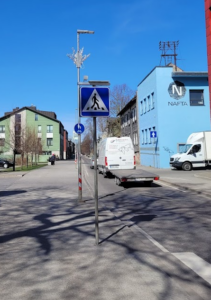
Thinnect Sensing created a solution to help build a smart community in Kalamaja by monitoring noise levels and traffic intensity, and helping improve traffic safety on various streets in the Kalamaja district. Road safety can be improved using intelligent lighting for the signs for pedestrian crossings that are already in place. The solution can compare noise levels and traffic density on various streets around the clock throughout the week.
The data it collects can be visualised on a dashboard created by Thinnect, but they can also be sent to other systems such as the Tallinn Cumulocity servers.
The joint work with the city of Tallinn went smoothly throughout the project, and several Tallinn authorities and the Põhja-Tallinn District Administration worked well with Thinnect on it. Issues that arose were resolved quickly, and the installation of the sensors was coordinated very quickly with the Urban Environment and Public Works Department and the Transport Department.
Solintel
The company started the project by developing an electronic solution for the direct current DC/DC solar and wind power central controller, as this would give the best result in the Estonian climate and guarantee the highest efficiency. Kalaranna street was chosen as the test location, and four lighting systems are being installed that have zero or negative net energy consumption over the year. The company also started to develop ways of using Solintel products as charging points for electric scooters that would use green energy to charge the scooters and would help tidy the scooters off the city streets when they are not in use.
The cooperation with the city of Tallinn has so far proven very efficient, professional and friendly, with particular recognition due to Tarmo Sule for his work in resolving ongoing questions.
KrattWorks
The project was to put drones at the disposal of patrols of the Tallinn Municipal Police Department (MUPO) and connect the data received from them with the control centre and management software. The project wanted to find out which problems a drone is able to solve, how drones can be used more effectively, and what practical requirements MUPO has for drones that can improve its work, and the software solutions they use. Several workshops were held as part of the project to gather information about the needs of MUPO, and on how and for what specific purposes they used the drones, and what the requirements and limitations were for using the drones.
The cooperation between the city of Tallinn, the Tallinn Municipal Police Department, and Tehnopol Science Park went very smoothly.
Mypak Solutions
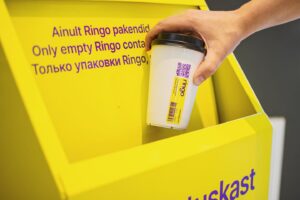
The project aimed to install RingoEco collection points around the Tehnopol Science Park campus in Tallinn and in the rooms of the Tallinn city government. The original plan for the project was exceeded many times over, as the project was run in 35 locations rather than the planned four. There were 65 packaging recycling points and 25 collection points set up in place of the planned four of each. Only in kitchen areas in office buildings were fewer recycling bins installed than planned, as it became apparent during the project that people were not yet used to the new service, and there was no desire simply to install the bins in every office kitchen area just for the sake of doing so. Greater attention was consequently focused on shopping centres, where food outlets joined the service to get more contact with it and more exposure for it.
The cooperation with the city of Tallinn went wonderfully well and the city reported on recycling of packaging on its television show. The department responsible for the circular economy helped in communicating with food outlets, like those on Kaarli pst, and worked with Tehnopol to organise an online seminar on providers of reusable packaging services for the staff of institutions run by the city.
Results of the 2020 Tallinnovation competition
A total of 12 projects qualified for Tallinnovation competition in 2020, from which the commission selected the five most promising ideas. We thank all the participants in the competition and wish the winners good luck and the ability to implement their ideas!
BIKEEP OÜ
Bikeep’s smart bicycle garages combine technology and environmental sustainability – a combination that can be used by all city residents. The Bikeep smart solution works on the principle of identification and allows renting out the same bicycle garage to different people, thus reducing the amount of necessary infrastructure to serve the required number of riders. In the future, the Bikeep system will enable the use of a bicycle garage with a Tallinn public card and has the potential to serve a person arriving at a public transport stop by bicycle and later as a passenger on public transport, all through the public card system.
Bikeep’s cooperation with each individual department of the City of Tallinn was good and new contacts were found in the City of Tallinn with whom to consider certain projects and cooperate in the future. All the offices of the City of Tallinn were supportive of bicycle garages and the development of bicycle traffic, and in general there has been a change in mentality of the city. In the future, it will certainly be easier to communicate with the city on various bicycle-related projects.
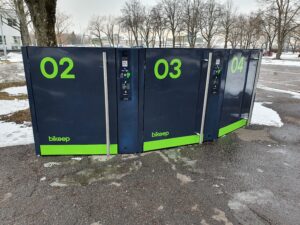
Problem: There are more and more cars in Tallinn and therefore there are more traffic jams than in many big cities. The use of public transport as the preferred mode of transport in modern society is declining (although it is free). More comfortable transport is preferred by people.
Solution: Smart public and private bicycle garages at public transport stops, to provide more protection from the weather and theft.
Result: More people will combine a bicycle-public transportation solution. The number of cars in urban traffic will decrease, the air will be cleaner, and noise and stress levels will be lower.
TEEDE TEHNOKESKUS AS
The Tallinnovation project enabled Teede Tehnokeskus to focus and accelerate hardware development activities and to adapt its products and services to suit urban conditions. This, in turn, increased the interest of both the city authorities and the companies providing road maintenance in the city in the idea presented by Teede tehnokeskus and the services offered. The 16 final locations of the autonomous mini weather stations were selected in cooperation with the Tallinn Environment and Public Utilities Board.
The new, upgraded mini weather stations support the creation of a safe, peaceful, and human-friendly urban environment and, among other things, help to contribute to the development of an environmentally friendly and safe transport system that supports Tallinn’s ambition to modernize and make road maintenance more sustainable. In addition, weather stations support other goals of the Tallinn City Development Strategy. The project has helped to introduce the company’s activities and innovative mini weather stations to potential customers both in Estonia and elsewhere.
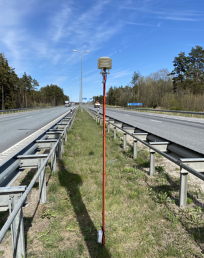
Problem: Road maintenance planning is based on a general forecast, there is no location-based road weather forecast, the monitoring network is sparse and the equipment is expensive.
Solution: Creating a network of road weather monitoring devices, launching road-specific weather forecasting, and publishing observation and forecast data. The stations are quick and inexpensive to install and the results will be received within one hour.
Result: Road weather forecasting and data output to optimize road maintenance planning and management.
R8Technologies
The aim of the R8 Technologies solution in the pilot project was to optimize the indoor climate of Kaja Culture Center, save energy costs by up to 20%, and achieve lower CO2 emissions. This makes their solution sustainable and supports the City of Tallinn’s goal to reduce its ecological footprint. There is no need to produce-buy-install physical products and everything is automatic – the solution includes artificial intelligence and is an extremely innovative solution.
The R8 Technologies solution generated a lot of talk and the need for it is known in Tallinn, unfortunately this project lacked a larger selection of suitable commercial buildings. However, new technological developments are in great need of such pilot projects, which help companies to better introduce their new services/products.
The cooperation with the representatives of the City of Tallinn and the Kaja Culture Center went smoothly and although the project could not be completed in full, R8 Technologies wants to continue cooperation with the city, Tehnopol, and the Kaja Culture Center in the future.
Problem: Commercial real estate consumes one fifth of the entire energy sector, of which about 8% is made up of technical systems such as ventilation, cooling, and heating. This is often costly, as real-time data is not used to ensure a comfortable indoor climate and manual errors can lead to human error.
Solution: Digital operator, which is an artificial intelligence software that takes the management of commercial real estate technical systems to the next level. Energy efficiency, comfortable indoor climate and technical conditions are the three key indicators monitored. AI increases system performance efficiency and data-driven automation analytics detects (HVAC) system errors.
Result: An automatically and efficiently controlled HVAC system that lowers costs and makes the system more energy efficient.
FUSEBOX
Participation in the Tallinnovation competition created an opportunity for Fusebox to start cooperation with the Finnish company Suomen Tekojää, and negotiations are also underway with other projects in Estonia and Finland. Many new contacts were made during the project, and the solution presented within the Tallinnovation competition has been received with great interest by the representatives of the ongoing pilot buildings.
The buildings connected to the Fusebox virtual power plant can increase or decrease their electricity consumption in the short term (within minutes), which in turn provides a balancing service to the Baltic electricity system and earns income and savings for the owners of the buildings connected to the network. The innovative virtual power plant will cost the city authorities the revenue that their flexibility will bring. The solution is smart, economical and cost-effective, and supports the goal of energy efficiency in the smart city of Tallinn. With the help of the city of Tallinn, it was easier to get in touch with the city’s sub-agencies within the pilot project, and the experience of cooperation is positive.
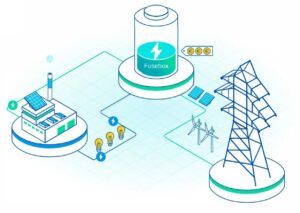
Problem: Wind turbines and solar panels do not generate electricity regularly. Due to changing weather conditions, electricity productivity is either too high or too low. However, demand is usually clearly structured.
Solution: Connect a number of different buildings to a virtual power plant to consume or save more or less electricity as needed.
Result: The Fusebox virtual power plant provides a service to the Baltic electricity system and earns revenue for electricity producers or electricity-producing buildings connected to the grid (finding consumers for instances of overproduction). The goal is to achieve 10-40% energy savings from indoor climate management.
AIOTEX
The goal of the City of Tallinn to become more modern and sustainable is possible with the help of the digitalSpace solution proposed by Aiotex. Using the solution, Tallinn residents can quickly and directly communicate with departments responsible for assets in the city space about related problems and issues, thus making the work of city employees more efficient.
The City of Tallinn’s 2035 strategy emphasizes the goal of making the communication between the city and the residents smoother and more direct. Another goal is that city residents can contribute to the maintenance of their home environment. Using the digitalSpaces platform, we can create a link between physical location and digital information – bus stops, buildings – so citizens can inform the building manager about possible problems, and get information about the building or control equipment (ie. doors, gates, heating, ventilation).
Thanks to the pilot, Aiotex has received confirmation of the need for its solution. As the solution is location-independent, it is also planned to be made available in foreign markets.
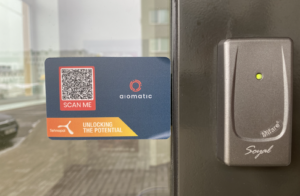
Problem: There are many objects in the public space and maintaining them takes a lot of time because information moves slow between people and parts. Everything is done manually.
Solution: Automate the information sharing process using a network of QR codes placed on objects. It can be used to obtain information about the objects’ owner, administrator, etc. Reporting a faulty object is easy and can be done by the consumer who is usually most interested in repairing it (eg a broken swing on a children’s playground).
Result: A tool created with a network of QR codes that connects all actors together (users, owners, administrators, and contractors). The solution connects physical objects, information systems, contractors, and citizens and requires nothing more than a regular smartphone to use.
